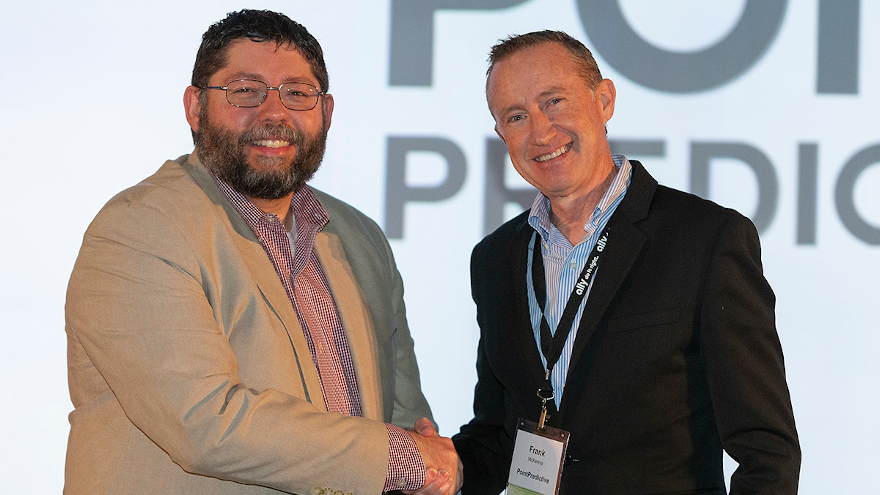From the editor: Fraud-prevention industry becomes victim, too

Auto Fin Journal senior editor Nick Zulovich, left, is pictured with Point Predictive's Frank McKenna during the Emerging 8 recognition lunch at the 2019 Automotive Intelligence Summit in Raleigh, N.C. Photo by Jonathan Fredin.
By subscribing, you agree to receive communications from Auto Remarketing and our partners in accordance with our Privacy Policy. We may share your information with select partners and sponsors who may contact you about their products and services. You may unsubscribe at any time.
CARY, N.C. –
Just like Ponzi schemes haven’t completely ruined the activities and benefits of investing, let’s hope this recent incident of malfeasance in connection with fraud prevention doesn’t submarine the great progress made by a host of experts and fintech firms.
To recap, the incident is what Audrey Strauss called, “the proverbial fox guarding the henhouse.”
Strauss, who is the acting U.S. Attorney for the Southern District of New York and William Sweeney Jr., the assistant director in charge of the New York Field Office of the FBI last week announced charges against Adam Rogas, the co-founder and former chief executive officer, chief financial officer and member of the board of directors of Las Vegas-based cyberfraud prevention company NS8.
Rogas was charged in a complaint in Manhattan federal court with securities fraud, fraud in the offer and sale of securities and wire fraud. Officials alleged that Rogas used fraudulent financial data to obtain more than $123 million in financing for NS8, of which he personally obtained approximately $17.5 million.
“As alleged, Adam Rogas was the proverbial fox guarding the henhouse,” Strauss said in a news release. “While raising over $100 million from investors for his fraud prevention company, Rogas himself allegedly was engaging in a brazen fraud. Today’s arrest of Rogas ensures that he will be held accountable for his alleged scheme.”
Sweeney Jr. added, “It seems ironic that the co-founder of a company designed to prevent online fraud would engage in fraudulent activity himself, but today that’s exactly what we allege Adam Rogas did.
Subscribe to Auto Remarketing to stay informed and stay ahead.
By subscribing, you agree to receive communications from Auto Remarketing and our partners in accordance with our Privacy Policy. We may share your information with select partners and sponsors who may contact you about their products and services. You may unsubscribe at any time.
“Rogas allegedly raised millions of dollars from investors based on fictitious financial affirmations, and in the end, walked away with nearly $17.5 million worth of that money,” Sweeney Jr. said. “Within our complex financial crimes branch, securities fraud cases remain among our top priorities.
“We’ve seen far too many examples of unscrupulous actors engaging in this type of criminal activity, and we continue to work diligently to weed out this behavior whenever and wherever we find it,” he said.
The colorful language from these federal officials is quite striking and appropriate. A good portion of the dialogue that happened during the Automotive Intelligence Summit revolved around fraud prevention such as individuals inflating income levels or online perpetrators creating synthetic identities to secure financing for vehicles that end up being shipped to places even most skilled skip-tracers and investigators struggle to find.
When this Department of Justice announcement arrived, I soon reached out to Frank McKenna, who is the chief fraud strategist and co-founder of AI firm Point Predictive, which helps auto lenders stop fraud, improve pull through and increase profitability by powering trust in lending. Point Predictive was one of the first Emerging 8 honorees highlighted during the Auto Intel Summit and Auto Fin Journal.
McKenna examined the case and offered this explanation for how this incident might have happened.
“It’s hard to believe that investors could have valued the company at $400 million by relying so heavily on bank statements and financial documents from Adam Rogas. But that appears to be what happened here,” McKenna told me via email.
“He was able to take the companies bank statements which showed the company had about $46,000 in it, and alter the balances to make it appear the company had over $40 million in it. He also created fictitious deposits showing millions of dollars in revenue from customers, when the real revenue was only thousands,” McKenna continued.
NS8, based in Las Vegas, is a cyberfraud prevention company that developed and sold electronic tools to help online vendors assess the fraud risks of customer transactions.
McKenna also offered an eloquent response about how the fraud-prevention industry should proceed in light of these allegations.
“I think it is a good lesson for us all. You can’t really rely on bank statements and paystubs as the ground truth when lending money,” McKenna said. “If something doesn’t make sense and seems off, there is probably fraud involved.
“In the end, they are victims of his fraud, and it’s a real shame. Hard-working and innocent employees lost their jobs in the middle of a pandemic, and investors will likely lose millions of dollars,” McKenna added.
To Point Predictive and the other firms and experts dedicated to curbing fraud, a salute to each of you and a reminder that nefarious incidents like this one are an outlier and not commonplace. And as Frank referenced, we all can collaborate to ensure it stays that way.
Nick Zulovich is senior editor of Auto Fin Journal and can be reached at [email protected].


